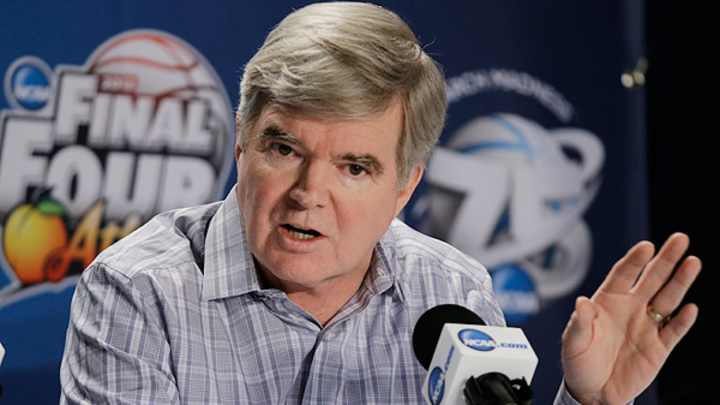Mark Emmert: NCAA won't budge on paying college athletes

President Mark Emmert said the NCAA is not close to paying student athletes. (Allison Joyce/Getty Images)

Factions calling for colleges to pay student athletes will not see the current policy against such a practice change any time soon, according to NCAA president Mark Emmert.
Speaking at a Marquette University forum on Monday, Emmert said the NCAA could see a major restructure in the near future, but that the paying of student athletes won't be a part of that shift. Emmert points to university presidents as the main roadblock to allowing players to be paid for jobs or for their athletic hours while other scholarship students are allowed to work on-campus jobs.
"One thing that sets the fundamental tone is there's very few members and, virtually no university president, that thinks it's a good idea to convert student-athletes into paid employees. Literally into professionals," NCAA president Mark Emmert said Monday at Marquette University. "Then you have something very different from collegiate athletics. One of the guiding principles (of the NCAA) has been that this is about students who play sports."
While the NCAA and schools are benefiting from the billion-dollar business that is college athletics, athletes like Heisman Trophy winner Johnny Manziel are scrutinized for benefiting financially from their performance. Texas A&M reported raising a record $740 million last year, in large part due to the success of Manziel and his teammates.
ROSENBERG: The NCAA has an amateurism mess on its hands
In contrast to the position taken by college presidents, the NCAA's Division I Board of Directors has twice approved allowing schools to give athletes a stipend to cover expenses such as clothes, off-campus meals and travel that are not covered by their scholarship. Smaller schools have led a vote against the move, citing the costs of such stipends. Larger schools with bigger budgets are better prepared to pay such stipends, and could push for a restructuring that allows them to act without the smaller schools' votes.
Commissioners of powerful conferences -- SEC, Big 10, Big 12 -- have gone public with their desire for a restructured NCAA. Emmert said discussions will begin at the organization's meeting next month. The agenda for the NCAA national convention will include a day-and-a-half forum that will allow the entire membership to express opinions.
"That could involve bringing all 350 members of Division I together and having every school vote on it," Emmert said. "It'll be a bit like a constitutional convention."
Emmert said that no school has threatened to leave the NCAA because to do so would jeopardize its participation in March Madness and other NCAA championships. But the chasm between large and small voting members is growing.
"They're having a really hard time finding common interests," he said.
